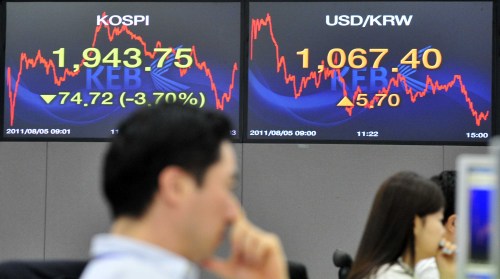Stumped by worries over the global economy and falling oil prices, the country’s benchmark Korea Composite Stock Price Index fell below the 2,000 mark for the first time since March 18.
The KOPSI, which began to dip on Tuesday, continued the decline to close at 1943.75 points on Friday, down 3.7 percent from Thursday.
The local currency ended at 1,067.4 won against the U.S. dollar after rising 5.7 won.
The KOPSI, which began to dip on Tuesday, continued the decline to close at 1943.75 points on Friday, down 3.7 percent from Thursday.
The local currency ended at 1,067.4 won against the U.S. dollar after rising 5.7 won.

The drop in U.S. markets and rising concerns about Europe prompted investors to sell their shares here, pushing the benchmark index to below the 2,000 line, which is considered by analysts to have psychological significance in the Korean market.
On Thursday, the Dow Jones Industrial averaged 512.76 points, or 4.31 percent, which is the largest drop since the onset of the global financial crisis of 2008.
The wide underperformance of the financial markets both at home and abroad prompted the local authorities to step up monitoring activities.
Vice Finance Minister Yim Jong-ryong on Friday chaired a conference of those in charge of economic policies and international financial markets to review issues regarding developments in the U.S., and general conditions in the foreign exchange and stock markets.
The Finance Ministry is also said to be planning to cooperate with the Bank of Korea and the Financial Services Commission over the weekend if additional attention is deemed necessary, ministry officials said.
The government had previously claimed that the local markets are not so vulnerable to external uncertainties.
“Until a few days ago, the (Korean) market was one of the few in the world that maintained positive changes compared to the beginning of the year,” said SK Securities Co. key strategist Park Jeong-woo. “Recently, though, as oil prices fall investors are divesting energy and related shares that led the market’s rise during the first half of the year.”
Regarding foreign investors selling Korean assets, Park said changes in the global market as well as changes in Japan’s financial policies are responsible.
“Foreign investors are likely to be motivated by worries about the uncertainties surrounding the global economy, as Asian and Korean markets are more sensitive to international changes than others,” Park said.
In the case of carmakers who were among the bigger losers, he pointed out that the companies have benefited from the yen’s strength.
“But with Japan intervening in the exchange market yesterday, investors seemingly motivated by reasoning that such benefits will disappear are selling automotive shares,” Park said. On Aug. 4, the Japanese government began buying up the dollar, while Bank of Japan announced measures aimed at increasing liquidity in the market.
Most analysts appeared to believe that the recent decline is unlikely to be a long term concern as global policy coordination is likely to rapidly ensue to help stave off further troubles.
As the markets recover, experts said investors were likely to regain composure ― as early as next week ― especially since both analysts and the government were in agreement that the fundamentals have not been undermined.
By Choi He-suk (cheesuk@heraldcorp.com)









![[Hello India] Hyundai Motor vows to boost 'clean mobility' in India](http://res.heraldm.com/phpwas/restmb_idxmake.php?idx=644&simg=/content/image/2024/04/25/20240425050672_0.jpg&u=)








